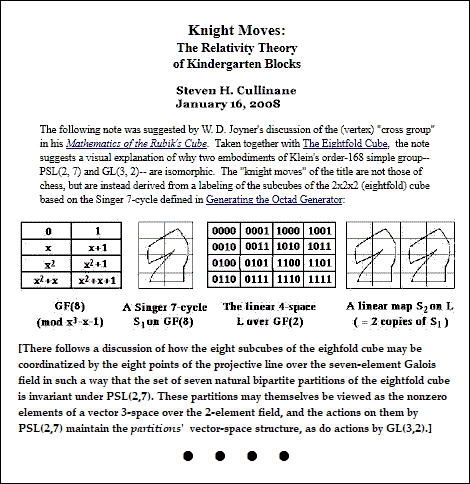The Romance
of Mathematics

On teachers of “core mathematics classes for non-majors, mathematics appreciation courses, and other lower level courses”:
“We are accustomed to being marginalized by society, our political leaders, and even our college and university administrations who often fail to see the scholarship involved in teaching. But how dare the Notices ignore us?”
— Complaint in the March 2007 Notices of the American Mathematical Society by “Julian F. Fleron, Ph.D., Professor of Mathematics, Westfield State College”
Let us examine Fleron’s alleged scholarship:
“Before each of my classes I put a quote on the board. The quote is either related to the mathematics we are studying, related to mathematics more generally, or related to learning and education. Student response has been tremendous, and I have found it to be very beneficial.” —Julian Fleron
Fleron offers us, without specifying an exact source, the following quotation:
“Mighty is geometry; joined with art, resistless. Euripides.“
A search for the source leads us to a quotation from 1914, a time when teaching did sometimes involve scholarship:
“1568. Mighty are numbers, joined with art resistless. EURIPIDES. Hecuba, Line 884.”
— Memorabilia Mathematica, by Robert Edouard Moritz, The Macmillan Company, 1914
But even in 1914, the scholarship, if one can call it that, was misleading. The 1914 quotation (which at least refers accurately to numbers, not geometry) is blatantly taken out of context to imply a connection with the mathematical art of number theory (as practiced by, say, G. H. Hardy) that is certainly not found in Euripides. The details:
HECUBA Sheltered beneath these tents is a host of Trojan women.
AGAMEMNON Dost mean the captives, the booty of the Hellenes?
HECUBA With their help will I punish my murderous foe.
AGAMEMNON How are women to master men?
HECUBA Numbers are a fearful thing, and joined to craft a desperate foe.
AGAMEMNON True; still I have a mean opinion of the female race.
This dialogue may have some relevance to today’s rumored selection at Harvard of a woman (Drew Gilpin Faust as Hecuba) to replace a man (Larry Summers as Agamemnon) in the president’s office. The dialogue’s only relevance to mathematics is in its reference to the perennial conflict between the sexes. Perhaps that conflict will serve to illustrate the title given by the Notices to Fleron’s complaint: “Teaching the Romance of Mathematics.”
























